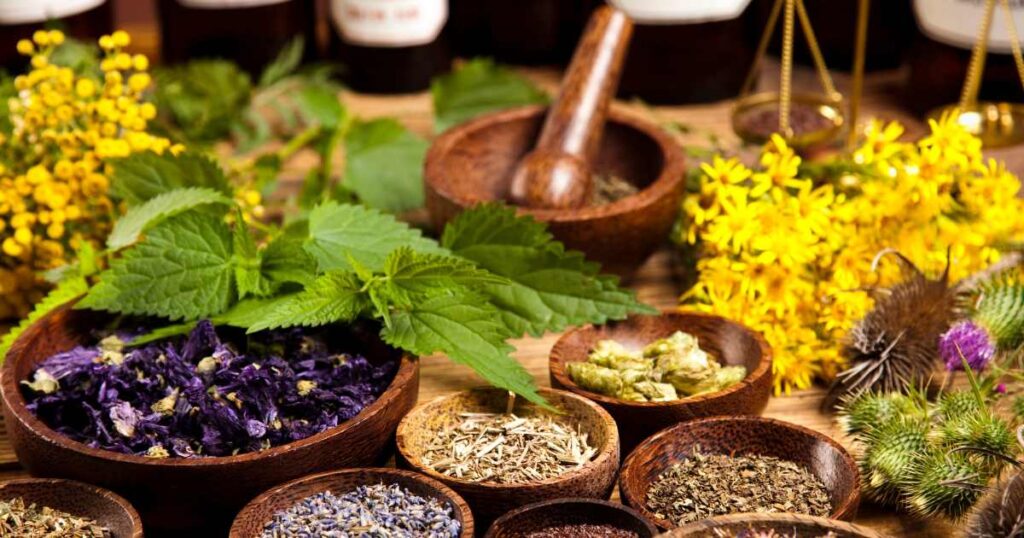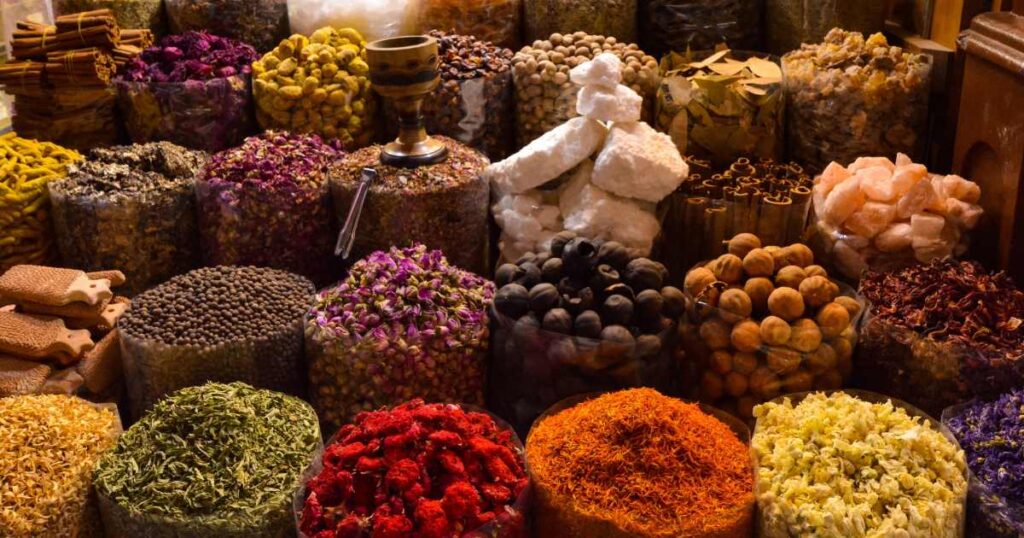With so many options to choose from at the grocery store, you might be wondering which herbs and spices are the best and most versatile for your vegan kitchen. But it’s not just a matter of which ones will add flavor to your meals, they also provide essential nutrients and health benefits, a factor that should be considered. But the truth is, you don’t need all of them, in fact, the herbs and spices in this list will do the trick.
Let's delve into the world of herbs and spices to unlock their potential in transforming your meals and promoting a healthy, enjoyable vegan lifestyle.
What’s the difference between herbs & spices?
Herbs and spices are both derived from plants and used to enhance the flavor and aroma of food. However, they differ in their source and properties.
Herbs are the leaves, stems, or flowers of plants, and can be used fresh or dried. They’re usually grown in temperate climates and are common seasonings in Mediterranean, European, and Asian cuisines.
Spices are obtained from other parts of plants, such as seeds, fruits, roots, or bark. Generally dried or ground when used in cooking, they are known for their strong flavors and are often associated with tropical climates.
Benefits of herbs & spices for vegans
Herbs and spices should be a regular component of your vegan lifestyle, primarily because of the added flavor, nutritional benefits, and general health benefits.
Firstly, culinary herbs and spices significantly improve the taste and aroma of vegan dishes. So if you’re sick of eating the same thing every day, a pinch of these seasonings can instantly re-ignite your appetite for that meal. Even just one or two of them can turn simple vegan dishes into delicious and diverse meals.
Incorporating herbs & spices into your diet won’t drastically alter your macronutrients, but there are plenty of other nutritional benefits. They are rich in antioxidants, minerals, and vitamins like vitamins A, C, and K, all of which are essential to your health. Many of them also contain anti-inflammatory and analgesic properties, which you can’t find in many other foods.
Their antioxidant and anti-inflammatory properties may help protect against chronic diseases, boost the immune system, and support digestion. Additionally, certain herbs and spices, like ginger and cinnamon, can help regulate blood sugar levels, making them beneficial for vegans and non-vegans.
20 Essential Herbs and Spices for Vegan Meals
Let’s start with the most common question: “Are herbs and spices vegan?” Yes, almost every single herb or spice that you’ve ever encountered is vegan. But there are exceptions like anchovy paste, fish flakes, and dried shrimp, which are not vegan based... given away by their name.
There are 40 primary spices and thousands of herb species found throughout the world. But you don’t need all of them. These are the 20 healthiest and most versatile herbs that you need to have in your kitchen if you live a vegan lifestyle.
Herbs
1. Basil - Basil is a fragrant, sweet herb with a slightly peppery taste. Popular in Mediterranean & Southeast Asian cuisines, it pairs well with tomatoes, garlic, and olives. Turn your kitchen into Little Italy with a homemade vegan margarita pizza, topped with fresh basil.
2. Cilantro - Cilantro has a unique, citrusy flavor commonly used in Mexican, Indian, and Thai dishes. Cilantro is the perfect addition to salsas, guacamole, and curries, and adds a much-needed kick to tofu and beans.
Fun fact: Some people have a smell-receptor gene cluster called OR6A2, which makes cilantro taste like soap.
3. Dill - Dill has a fresh, slightly tangy taste with a hint of anise. Popular in Eastern European & Scandinavian dishes, dill pairs well with cucumber, potatoes, and beets. Add fresh dill to your salads & dressings, or try your hand at making your own dill pickles.
4. Mint - Mint has a cool, refreshing taste that works well in both sweet and savory dishes. It’s often used in Middle Eastern and North African dishes like tabbouleh and other grilled vegetables. If you’re craving sweet & minty, add some to your vegan smoothies and desserts.
5. Oregano - Oregano is an earthy herb with a slightly bitter flavor. A staple of Mediterranean and Mexican cuisines, oregano is perfect for seasoning tomato-based sauces, sprinkling on roasted vegetables, and adding to bean dishes.
6. Parsley - Parsley is a versatile herb with a fresh, grassy flavor. It is commonly used in European, Middle Eastern, and North African cuisines. It’s a staple of dishes like tabbouleh and chimichurri sauce, but can easily be sprinkled over roasted vegetables, pastas, or winter dishes.
7. Rosemary - Rosemary has a strong, piney flavor with a slightly bitter taste that’s common in Mediterranean kitchens. Rosemary pairs well with potatoes, mushrooms, and lentils, and can be used in stews, soups, and roasted vegetable dishes as well.
8. Sage - Sage has a warm, slightly bitter taste with hints of mint and eucalyptus. Popular in European and Mediterranean cuisines, it pairs best with butternut squash, white beans, and pasta dishes, as well as vegan stuffings and sauces.
9. Tarragon - Tarragon’s distinctive, slightly sweet flavor is what makes it one of the most used herbs in French cuisine, the pinnacle of fine dining. Tarragon pairs well with artichokes, asparagus, and mushrooms, and can be added to sauces, dressings, and infused oils for a unique flavor.
10. Thyme - Thyme has a subtle, earthy flavor with a hint of mint. It is a staple in Mediterranean and French cuisines. Add another layer of flavor to stews, lentil dishes, and roasted vegetables without overpowering the entire dish.
Spices
11. Cinnamon - Cinnamon is a warm, sweet spice with a slight earthiness, prevalent in both sweet and savory dishes. Cinnamon adds depth to oatmeal, fruit desserts, and Moroccan-inspired vegetable tagines.
12. Cloves - Cloves have a strong, sweet, and slightly bitter flavor. They are commonly used in Indian, Middle Eastern, and North African cuisines. Cloves pair well with pumpkin, apples, and rice dishes, and tie flavors together in spice blends and baked goods.
13. Cumin - Cumin has a warm, earthy flavor with a hint of bitterness. It is a staple in Indian, Middle Eastern, and Mexican cuisines. Cumin is perfect for seasoning lentil soups, chickpea dishes, and vegetable curries.
14. Ginger - Ginger has a spicy, slightly sweet, and warm flavor. Commonly used in Asian, Indian, and Caribbean cuisines, ginger is great in stir-fries, curries, and soups. It pairs well with tofu, tempeh, and practically any vegetable.
15. Nutmeg - Nutmeg’s warm, sweet, and slightly nutty flavor is often found in European, Indian, and Middle Eastern dishes. Nutmeg is perfect for seasoning roasted root vegetables, adding depth to creamy sauces, and sprinkling on top of vegan eggnog or plant-based lattes.
16. Paprika - Paprika is a ground spice made from dried red peppers, and it has a sweet, smoky, and slightly spicy flavor. It is commonly used in Spanish, Hungarian, and Middle Eastern cuisines. Paprika pairs well with potatoes, bell peppers, and chickpeas, and can be used in stews, soups, and roasted vegetable dishes.
17. Saffron - Saffron is a unique, slightly bitter spice with a subtle floral aroma. Found in Mediterranean, Indian, and Middle Eastern dishes, it’s a great color & flavor addition to rice dishes, vegan paellas, and vegetable stews.
18. Star Anise - Star Anise has a sweet, licorice-like flavor. Grown primarily in Asia, you may have to venture into your Asian market to find it. But if you manage to locate it, pair it with tofu, tempeh, and even fruit, or add it to sauces, soups, and spice blends.
19. Turmeric - Turmeric has a warm, earthy flavor with a slightly bitter taste. It’s a staple of Indian and Middle Eastern cuisines, adding color & depth to your plate. Try it out in curries, lentil soups, and rice dishes. Specifically, it pairs well with cauliflower, potatoes, and legumes.
20. Cardamom - Cardamom has a complex, sweet, and slightly spicy flavor. It is commonly used in Indian, Middle Eastern, and Scandinavian cuisines. Cardamom is great in practically any dish from rice to baked goods and even tea.
Herbs and spices are essential to a healthy vegan diet. Not only do they transform the taste and aroma of plant-based dishes that can sometimes feel plain, but also offer numerous health benefits. By adding these to your kitchen, you can enjoy consistently delicious meals while reaping the rewards of antioxidants, vitamins, and minerals.




